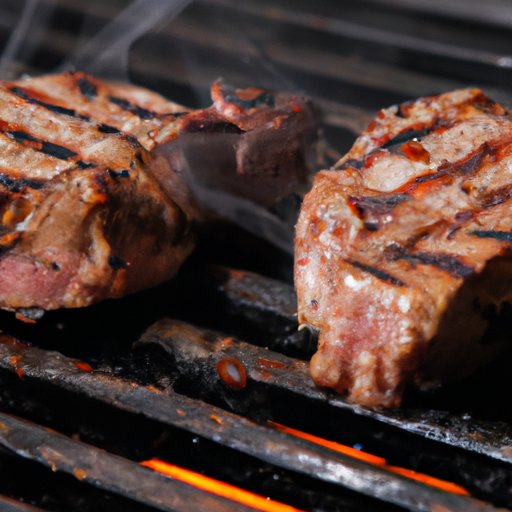
I. Introduction
Grilling steak can be a daunting task, but with the right techniques and preparation, you can easily cook the perfect steak every time. In this article, we will guide you through the process of grilling steak, from choosing the right cut to serving it on the plate.
II. Step-by-Step Guide
Before you start grilling, you need to prepare your steak properly. Take your steak out of the fridge at least 30 minutes before cooking and let it rest at room temperature. This ensures that the steak cooks evenly. Pat the steak dry with paper towels and season it with salt and pepper according to your taste.
When you’re ready to grill, preheat your grill to high heat. Brush the grates with oil to prevent the steak from sticking. Place the steak on the grill and cook for about 4-5 minutes on each side for a medium-rare steak. Use tongs to flip the steak, not a fork which may cause the juices to escape. Check the internal temperature of the steak with a meat thermometer to ensure it’s cooked to your desired level.
When the steak is done, remove it from the grill and let it rest for a few minutes before slicing it against the grain. This allows the juices to redistribute and results in a juicier steak.
III. Different Cooking Methods
There are two main methods of grilling: direct heat and indirect heat. Direct heat is when the steak is placed directly over the heat source, resulting in a crusty exterior and juicy interior. Indirect heat involves cooking the steak next to the heat source, resulting in a slower, more even cooking process.
When cooking thinner cuts of steak, such as flank or skirt steak, direct heat is recommended. For thicker cuts, such as ribeye or porterhouse, indirect heat works well. Indirect heat is also ideal for cooking steak with bones, as it prevents the bones from burning and imparting a bitter flavor to the meat.
IV. Seasoning and Flavor
The seasoning you choose for your steak can make all the difference in its flavor. Marinades, rubs, and sauces are all great ways to add flavor to your steak. Marinades are usually made with an acidic ingredient like vinegar or citrus, which helps tenderize the meat. Rubs are dry mixtures of spices and herbs that add flavor and create a crust on the steak. Sauces are a great way to add a finishing touch to your steak.
When choosing flavors for your steak, consider the cut you’re using. For example, a sirloin steak pairs well with a soy sauce-based marinade, while a ribeye steak benefits from a garlic and herb rub. When seasoning your steak, make sure to do so before grilling, as this allows the flavors to penetrate the meat.
V. Choosing the Right Cut
When it comes to grilling steak, not all cuts are created equal. Filet mignon, for example, is a tender but lean cut that requires careful cooking to prevent it from becoming overcooked and dry. Ribeye, on the other hand, has more marbling and fat that creates a rich, beefy flavor and keeps the steak moist during cooking. Flank steak, although tougher, can benefit from a marinade that helps to tenderize the meat.
It’s important to choose the right cut based on your personal preference and the cooking method you plan to use. If you’re using direct heat, thinner cuts like flank steak and strip steak work well. For indirect heat, thicker cuts like ribeye and porterhouse are recommended.
VI. Tools and Equipment
When it comes to grilling steak, having the right tools is essential. A reliable grill, long-handled tongs, and a meat thermometer are all must-haves. Before grilling, make sure to clean the grill grates with a wire brush and oil them to prevent sticking. During grilling, use tongs to flip the steak and avoid piercing it with a fork. After grilling, use a grill brush to clean the grates.
VII. Timing and Temperature
Timing and temperature are crucial factors in cooking the perfect steak. The internal temperature of the steak determines how well-done it is. For a rare steak, the internal temperature should be 120-130°F, medium-rare should be 130-135°F, medium should be 135-145°F, medium-well should be 145-155°F, and well-done should be 155°F and above.
Cooking times vary depending on the thickness and cut of the steak. A 1-inch thick steak takes about 4-5 minutes on each side for medium-rare, while a 2-inch thick steak can take up to 10 minutes on each side for medium-rare. The best way to ensure that the steak is cooked to perfection is to use a meat thermometer.
VIII. Serving Suggestions
Steak pairs well with a variety of side dishes, from classic steakhouse sides like mashed potatoes and creamed spinach to lighter options like grilled vegetables and salads. For a creative twist, try serving steak with salsa verde or a chimichurri sauce. When plating your steak, cut it against the grain to ensure that it’s tender and juicy.
IX. Conclusion
Cooking the perfect steak on the grill may seem challenging, but with the right preparation, tools, and techniques, it’s easier than you think. Remember to choose the right cut, season it well, and cook it to the right temperature. With these tips in mind, you can grill the best steak that’ll impress your family and friends.





